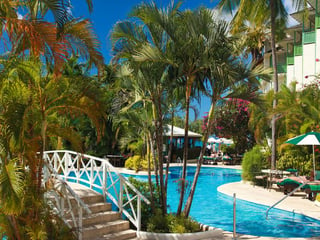Barbados cuisine, fragrant fish, fresh fruit and sizzling spices
Read time: 7 mins
A tropical blend of old and new, the local cuisine in Barbados brings together a combination of flavour sensations from all across Europe, Africa and the Caribbean to create a unique culinary experience revelled by almost everyone lucky enough to sample it.
Fried and grilled fish which are sourced locally from the surrounding ocean are the star of the show, whilst the abundance of fresh fruit and vegetables found all over the island make the perfect accompaniments. Dishes are topped off with a handful of fragrant herbs and spices, bringing all the ingredients together and adding an extra depth of flavour.
Due to the strong British influence, many ingredients dishes in Barbados will probably sound familiar – however, whilst some dishes may have the same name as popular British favourites, the ingredients and cooking methods are often different than expected.

A history of food in Barbados
The cuisine in Barbados is largely influenced by recipes, cooking methods and traditions from all over the world. Portugal, Britain and West Africa all had a major input into the gastronomy of Barbados, since they all controlled or inhabited the island at various points in the past.
In 1625, the island was inhabited by the Portuguese, followed by the British in 1627 who brought slaves over from West Africa to work in the sugar plantations. Barbados continued to be a British colony up until 1966, when it became independent.
Out of all the cultures which have influenced the eclectic Barbadian cuisine, the most prominent is probably the British. Even today, many home cooks and restaurant chefs use British techniques, ingredients and methods in the kitchen.
Key ingredients in Barbados
Many traditional dishes in Barbados are cooked with a combination of British and West African ingredients, topped off with a pinch of local herbs and spices.
The most commonly used ingredients in Barbadian food come from what can be found on and around the island. Thanks to the surrounding ocean which is teeming with marine life, fish and seafood are incredibly popular. Some of the most commonly used fish are: flying fish, swordfish, kingfish, yellow-fun tuna, mahi mahi, red snapper, shark and marlin. Fish dishes are usually kept simple, with the main ingredient being coated in seasoned breadcrumbs and deep-fried.
Fruits and vegetables grow prominently throughout the island and make wonderful side dishes to accompany the fried fish. Some of the most commonly-found vegetables in Barbados include sweet corn, potatoes, sweet potatoes, okra, asparagus and cassava. Just like the fish, things are also kept simple when it comes to the vegetables, with most being lightly cooked then drizzled with lime juice and butter.
Seasonings play a huge role in Barbadian cooking and with such a large selection produced locally, cooks and chefs have a vast array to choose from. Instead of only using one type of seasoning to flavour a dish, herbs and spices are usually used together to create the tell-tale aroma of Barbadian cuisine. Commonly used seasonings in Barbados are very similar to those used every day in the UK and include: garlic, parsley, marjoram, basil, thyme, cloves, paprika, salt and pepper.
In the 1640s, the British began growing sugar cane throughout Barbados. With such easy access to this sweet ingredient, it’s not surprising that sweet treats are also very popular throughout the island. Whilst locals normally don’t bother with baked goods, they do make all sorts of candy-like sweets, made by combining sugar with fruits and nuts.
Savoury dishes
Flying fish and cou cou
This is the national dish of Barbados served in homes and eateries throughout the island. Flying fish is a large fish which is in abundance throughout the waters which surround Barbados. Whilst there are no rules when it comes to the cooking technique, most locals choose to batter and deep fry the fish, steam it or grill it.
The unusual-sounding cou cou is a dish passed down by West African slaves and involves stirring cornmeal and okra together with water and butter until it develops a smooth and velvety texture. The whole dish is then smothered in a delicious sauce made of tomato, garlic, onion, herbs and butter before serving.
Fried fish cakes
Unlike the fish cakes we all see advertised inside fish and chip shops throughout the UK, Barbados-style fried fish cakes are a totally different affair. These delicate flavour-packed balls are filled with salted cod and Bajan seasoning.
They get their wonderful puffed-up shape from excess air which is created inside the ball during the cooking process. Fried fish cakes are so popular in Barbados that you’ll find them absolutely everywhere – from the upper class eateries in five-star hotels to tiny off-the-beaten track food stalls.
Pudding and souse
Whilst some Barbadian dishes are clearly self-explanatory, pudding and souse is a dish that you wouldn’t choose from a menu without first asking what it was. The basics of this dish are lean strips of pork (the souse) and steamed sweet potato (the pudding) which is usually served up alongside breadfruit and cucumber pickle. Many locals say this dish is best enjoyed when paired with an ice-cold beer, whilst others prefer to eat their souse with a rum and mixer.
If you visit Barbados, you might find pudding and souse hard to come by. It rarely features on the menu in the main resorts and is most commonly made in locals’ homes and off-the-beaten-track locations.
Macaroni pie
This deceptively Italian-sounding dish is actually one of the most popular meals in Barbados. A slightly different take on the American mac and cheese we’re all familiar with, macaroni pie is made by mixing cooked macaroni with melted cheddar cheese, evaporated milk, ketchup and mustard before baking it in the oven. When it’s time to serve, the baked macaroni is tipped out of its dish onto a plate and sliced into pieces like a pie.
Sweet dishes
Tamarind balls
Since sugar is grown on the island, it is no surprise that desserts are so popular. Tamarind balls are one of the simplest and most delectable treats Barbados has to offer. These bite-sized round golden balls are a sweet combination of sugar, tamarind and flour which work together wonderfully to create deliciously simple treat which is sure to satisfy even the sweetest tooth.
Guava cheese
Guava cheese is another popular candy-like sweet. Similar to fudge or toffee, this dish is made by stirring together the pulp of guava with sugar, lime juice and spices over a high heat before pouring the mixture in a dish to set. The result is a sugary, yet tart slab of candy which is cut into bite-sized squares before being coated in even more sugar, ready to serve.
Conkie
Conkie is a very special dish usually only made in Barbados in November. Whilst indulging in one of these sweet snacks started out as a way to celebrate Guy Fawkes Day during the time the British ruled the island, the conkie became associated with Barbados’ Independence Day, following the island gaining independence during the same month in 1966.
This bizarre-sounding dish is comprised of cornmeal, flour, pumpkin, butter, sweet potato, coconut, raisins, sugar and spices which are all cooked together. When they reach the desired consistency, the ingredients are wrapped in a banana leaf or fig leaf and steamed.
Coconut bread
The Barbadian equivalent of banana bread, coconut bread is a sweet baked good, often enjoyed alongside a mug of coffee for breakfast. This quick bread is created by stirring together the usual quick bread ingredients – sugar, butter, eggs, water, vanilla, flour and baking powder – with the addition of nutmeg, mixed spice, cinnamon and grated coconut. To please those with an extra-sweet tooth, raisins are sometimes added to the dough, too.
Unlike a traditional loaf of bread, this coconut bread has a more cake-like texture, making it suitable for a dessert, as well as a sweet breakfast treat.
Barbadian food in festivals
The epicurean event of the season in the Caribbean – the Barbados Food & Wine and Rum Festival will return to Barbados between 22nd to 25th November 2014. And it’s not an event you want to miss. It’s delicious food and amazing wine and rum – all set on the perfect stage that is Barbados. So come savour some of the world’s best culinary artists together in a beautiful intimate setting among beautiful people – all living and loving every moment of life.
Although it’s not a festival according to the dictionary definition, the Friday Night Fish Fry which takes place each week in the fishing town of Oistins drums up enough excitement to give any food festival a run for its money.
At Oistins’ Fish Fry, the main attraction is the food, which hundreds of locals and visitors alike flock to the south coast town every weekend to sample. The set up is simple – a number of local vendors from all over the island come together in Oistins and put up stalls, each offering a tempting variety of local delicacies.
All of the fish is caught locally and regular appearances are made by tuna, marlin, swordfish, flying fish and mahi mahi. Not everyone is a seafood lover, so some vendors even offer a chicken alternative. Whilst some vendors prefer to grill their fish, others opt to fry it, providing you with plenty of choice and guaranteeing all palates are pleased.
After pilling your plate high with fish, you grab a drink and settle down in the rustic seating area which is usually crowded with others digging into their fish platters and a handful of old locals enjoying a few games of dominoes. Whilst it’s certainly not glamorous, it is without a doubt authentic and truly delicious.
Fried flying fish recipe
This recipe for flying fish serves two as part of a main meal and takes less than 30 minutes to prepare. Flying fish are available in supermarkets all-year-round: occasionally fresh, but more often than not you’ll only find them frozen.
This type of fish is usually sold whole, so you’ll have to clean it and fillet it yourself at home. If you don’t want the hassle of filleting the fish yourself, you can ask the fishmonger to do it for you if you’re buying it fresh from the counter, or just be careful and pick the bones out when eating.
The traditional Barbadian way to serve flying fish is to pair it with cou cou. Since this side includes some uncommon ingredients and can be a challenge to make, you’ll be pleased to hear that there are plenty of other alternatives. Fried flying fish is a very mild-tasting white fish and therefore pairs well with side dishes you’d normally serve up with cod, such as chips, mashed potato or salad.
Ingredients
2 fillets of flying fish
1 lime
120g fresh breadcrumbs or 60g dried breadcrumbs
1/2 teaspoon salt
1/4 teaspoon black pepper
1 teaspoon dried chives
1 teaspoon paprika
100g all-purpose flour
1 egg
1 tablespoon water
Oil for frying
1. Use some kitchen paper to pat the flying fish fillets dry
2. Roll the lime up and down on a flat surface to loosen up the juices and squeeze them out into a shallow dish that’s large enough to fit the fish in
3. Place the fish fillets into the dish with the lime juice. Leave for five minutes before turning over to ensure both sides soak up the lime juice
4. Whilst the fish fillets are marinating, prepare the breadcrumbs. Mix the fresh or dried breadcrumbs in a small bowl with salt, pepper, dried chives and paprika
5. Stir well and taste – add more seasoning if you think it needs it. Tip the seasoned breadcrumbs into a large shallow dish
6. Sprinkle the flour onto a second large shallow dish
7. Crack the egg into a small bowl and beat lightly with the tablespoon of water. Tip the egg mixture into a third large shallow dish
8. Pour the oil into a large shallow frying pan, ensuring there is enough oil to completely cover the fish fillets. Heat the oil to a high heat
9. Whilst the oil is heating, remove the fish fillets from the lime marinade and dip them into the flour, flipping each fish fillet over to ensure all sides are well covered with flour
10. Take each floured fish fillet and dredge it in the egg mixture, again, flipping each one over to make sure all sides are completely covered. Hold each fillet above the egg dish for a couple of seconds to allow the excess to drip off
11. Take each egg-covered fish fillet and dip it in the seasoned breadcrumbs, turning each fillet to make sure they’re all well coated
12. When the oil is hot, carefully place each breadcrumb-coated fish fillet into the oil. Cook the fish for three minutes on each side, until the breadcrumbs are golden and the fish is cooked through
13. Remove the fish fillets from the oil and leave to rest for a minute on kitchen paper to remove the excess oil before serving
Further reading: Our list of top 10 places to eat in Barbados is sure to come in handy if you’re planning on visiting the Caribbean island.
More Inspiration
Recommended holidays


















